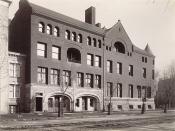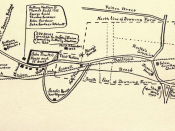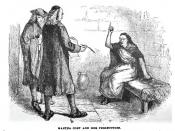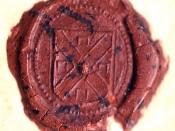How can just one person or thing have such a great effect on so many more, such as one little rock falling could cause twenty more to tumble as well? As I was reading Arthur Miller's novel, The Crucible, I noticed this was a very significant theme. John Proctor is a dominate character in the story, who is greatly respected by the Salem community. Although he is a powerful leader, he has some unworthy traits also. Throughout the book, he seems quite stubborn. He also appears to be an unfaithful follower of the Lord. John Proctor has a great effect on the events of the story as it unfolds.
Miller describes John as "respected and even feared in Salem" (1245; Act I). By saying John is feared in Salem, the author is trying to a make a point of how commanding John really is; so much that people are afraid of him.
In every scene, you can see John's attitude of superiority to many of the villagers. For example, John exploded, "Out with you!", while ripping up Ezekiel Cheever's, the Deputy Governor, warrant when he sent for John's wife to be arrested. Many people view John Proctor as a man to emulate. Parris ranted, "We are not Quakers here yet, Mr. Proctor. And you may tell that to your followers!" (1251: Act I), which exemplifies just how essential John is in Salem. John has an overall lasting effect on the people of his community, so much that he can influence others on many issues.
I noticed all through the story that John Proctor is a very willful male. When John wants something, he will not give up until it is his. After Elizabeth, John's wife, is arrested, John refuses to let his wife be jailed. He is so desperate that he even goes around his neighborhood asking for signatures to free his wife along with two others: "Will you read this first, sir? It's a testament. The people signing it declare their good opinion of Rebecca, and my wife, and Martha Corey" (1297; Act III). Although he only hopes for the best, many times he becomes very forceful with people, even his wife: Elizabeth pleaded, "I would go to Salem now, John- let you go tonight" (1269; Act II), but John only responds by becoming frustrated and saying, "I'll think on it." (1269; Act II). Even Miller portrays John Proctor as "the kind of man- powerful of body, even-tempered, and not easily led" (1245; Act I). John always tends to speak to others with great authority and uses his supremacy to persuade them.
Although John is a much appreciated man of Salem, he is also a great sinner. One of his greatest sins all through the novel is his affair with Abigail. Unfortunately his sin causes many problems. Adultery was a great sin of the church. Because the Puritans were so religious, this was considered a great offense. Besides having the guilt of sinning against the church, he also has to live with the distrust of his own wife. In Act I, Abigail confesses her love for him once again, just to be rejected by John for the last time. Because of this, Abigail harbors hatred for Elizabeth, and eventually accuses Elizabeth of being a witch, which leads to her arrest. If John would have confessed his affair before the trials, his own arrest could have been avoided as well. In admitting his sin to the court, Elizabeth denies that he had any relations with Abigail. This just makes John appear as a liar, and soon enough he is jailed and hung. Reverend Hale also becomes suspicious of Proctor when he is unable to name all of The Commandments. John confesses to working on Sundays: "I- I have once or twice plowed on Sundays." (1295; Act III). Because Miller represents John as a sinner, we can better understand and relate to his character.
Miller makes it known that in this novel many people are very concerned with their reputation. We can see it perfectly through John Proctor. Until Act IV, John is always thinking about what others sense about him, and he does not allow himself to appear weak because of the fact that it might make him look inferior. After being sentenced to hang, John realizes he has no sense of honor. When first being asked to confess guilty to witchcraft, John contemplates his decision. In the end he proclaimed, "Because it is my name! Because I cannot have another in my life! Because I lie and sign myself to lies! Because I am not worth the dust on my feet of them that hang! How may I live without my name? I have given my soul; leave my name!" (1333; Act IV). It is at this time when John recognizes that he might be a powerful influence in Salem, but he does not have any personal integrity. He does not confess for the people, but for himself and his pride.
Towards the end of the novel we find John Proctor extremely disappointed in himself, for he feels he is dishonorable. In Act IV, he reveals this statement untrue. He wishes to repent his sins by not lying in order to save his own life. Also, I believe Miller is trying to illustrate how a man can significantly alter from one life-changing experience. John Proctor wants people to remember him not as a coward, but as a man who will never be forgotten for his bravery.





